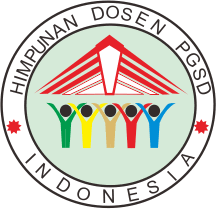Implementasi nilai toleransi tingkat elementary school di jungle school kota salatiga
Abstract
Tolerance is a way of thinking that can be translated into an act of mutual openness, mutual respect, character or attitude of respect for different positions and / or contrary to their position as a necessity for a pluralistic nation. The implementation of theTolerance Value Elementary Level in the Jungle School of Salatiga City can be seen when the learning is carried out. Teaching and learning activities are carried out as a form of habituation to create the implementation of the value of tolerance, so that the Jungle School creates a peaceful and tolerant atmosphere. This research is a qualitative research with a case study method. Jungle School was chosen as the subject in this study. Data analysis in the study used an interactive model analysis technique by Miles and Huberman. The results of this study indicate that the implementation of the value of tolerance has been carried out well in the Jungle School with an indication that all aspects of tolerance have been carried out.
Keywords
Full Text:
PDFReferences
Ramadhan, “Lingkungan Pendidikan dalam Implementasi Pendidikan Karakter,” J. Pendidik. UNIGA, vol. 8, no. 1, pp. 28–37, 2017, [Online]. Available: http://digilib.uinsgd.ac.id/id/eprint/5122.
Sri Soryani, “PENANAMAN SIKAP TOLERANSI DI KELAS V SD NEGERI SIYONO III KECAMATAN PLAYEN KABUPATEN GUNUNGKIDUL,” J. Pendidik. Guru Sekol. Dasar, p. 2015, 2015, [Online]. Available: http://weekly.cnbnews.com/news/article.html?no=124000.
B. Zaman, “Urgensi Pendidikan Karakter Yang Sesuai Dengan Falsafah Bangsa Indonesia,” J. Kaji. Pendidik. Islam dan Stud. Islam, vol. 2, no. 1, pp. 16–31, 2019, [Online]. Available: https://www.ejournal.stainupwr.ac.id/index.php/al_ghzali/article/view/101.
P. Supriati, “Pengembangan instrumen pengukuran toleransi pada mahasiswa sekolah menengah pertama,” Wiyata Dharma J. Penelit. dan Eval. Pendidik., vol. 6, no. 2, p. 117, 2018, doi: 10.30738/wd.v6i2.3390.
Muawanah, “Pentingnya Pendidikan untuk Tanamkan Sikap Toleran di Masyarakat,” J. Vijjacariya, vol. 5, no. 1, pp. 57–70, 2018, [Online]. Available: https://osf.io/vqgj4/.
S. & H. Amir, “Pencegahan Sikap Intoleransi Pada Siswa Melalui Penguatan Pendidikan Pancasila,” Semin. Nas. Pendidik. Dasar, vol. 1, pp. 52–62, 2018.
I. Tholkhah, “Potensi Intoleransi Keagamaan Siswa Sekolah Di Jawa Dan Sulawesi,” EDUKASI J. Penelit. Pendidik. Agama dan Keagamaan, vol. 11, no. 1, pp. 1–18, 2013, doi: 10.32729/edukasi.v11i1.422.
S. V. Eka, F. N. Setiawan, and M. Rozin, “BAHASA DAN SASTRA INDONESIA SEBAGAI PEMBENTUK RUANG Abstrak,” J. Stud. Budaya Nusant., vol. 2, no. 2, pp. 80–84, 2018.
A. Auditor, I. Kementerian, A. Ri, A. Moral, and K. Kunci, “Pendidikan Monitoring Intolerant Behavior in.”
I. Sanusi and E. Muhaemin, “Intoleransi Keagamaan Dalam Framing Surat Kabar Kompas,” Commun. J. Ilmu Komun., vol. 3, no. 1, pp. 17–34, 2019, doi: 10.15575/cjik.v3i1.5034.
Sugiyono, “METODE PENELITIAN PENDIDIKAN,” Metod. Penelit. Pendidik. (Pendekatan Kuantitatif, Kualitatif, dan R&D)., 2015.
C. Mulvey, “Wage Policy and Wage Determination in 1983,” J. Ind. Relations, vol. 26, no. 1, pp. 112–119, 1984, doi: 10.1177/002218568402600108.
F. Purbasari, “Pengaruh Model Pembelajaran Value Clarification Technique (VCT) Tipe Analisis Nilai Berbantuan Media Video Pembelajaran Terhadap Penguasaan Kompetensi Dasar,” J. Penelit. Pendidik., vol. 19, no. 2, 2016.
G. Nursavitri, “Pengaruh Sikap Toleransi Terhadap Penerapan Nilai-Nilai Pancasila Di Rukun Warga Iv Kelurahan Wonokarto, Wonogiri,” Educitizen, vol. 1, no. 1, p. 242260, 2013.
E. Pertama and D. A. N. Edisi, “Vol. 3, No (1) Mei 2017,” vol. 3, no. 1, pp. 12–28, 2017.
A. Supriyanto and A. Wahyudi, “Skala karakter toleransi: konsep dan operasional aspek kedamaian, menghargai perbedaan dan kesadaran individu,” Couns. J. Bimbing. dan Konseling, vol. 7, no. 2, p. 61, 2017, doi: 10.25273/counsellia.v7i2.1710.
Refbacks
- There are currently no refbacks.



